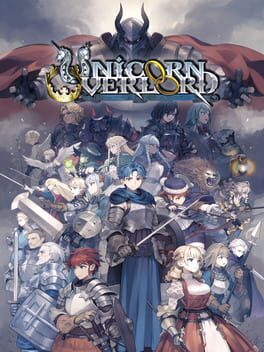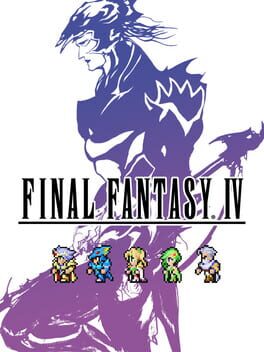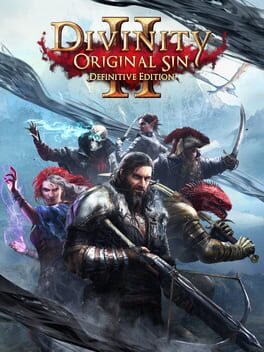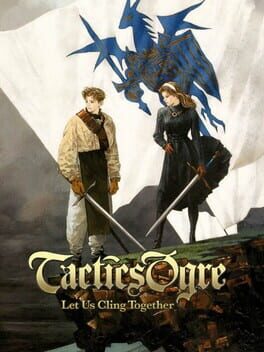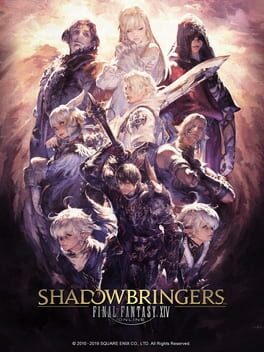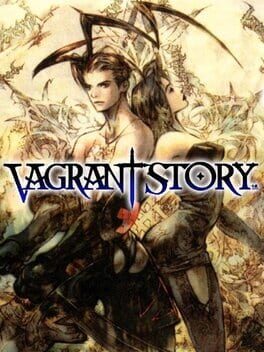Kletian
29 reviews liked by Kletian
Unicorn Overlord
2024
One of the best japanese SRPGs I've ever played. While it may not be the best in terms of challenge, as a whole package it's phenomenal. The combat is a culmination of multiple games brought together and then refined to a phenomenal degree. The amount of classes and skills you can unlock as well as the multiple accessories and gear on top of multiple side quests throughout the world makes the flow of the game almost perfect. There was never a moment when I was thinking of what to do since there was almost something to do at any moment. Completing every quest and getting all the side content weapons didn't even feel like a choir, it just felt natural. For me at least what puts this above most other Japanese SRPG's is the level of customization. From the gear to appearance and party compositions, I just love having a bunch of options.
Alain is a fucking chad. Obviously, the theme of the game means death is a must but it's so refreshing having an MC who is nice and virtuous but won't hesitate to kill if/when it needs to be done. Him being stoic yet vocal makes him feel more "real" than plenty of other J/SRPG protagonists. He fits the role of a king despite his young age and that almost solely has to do with Josef. The story is pretty generic and filled with plenty of fantasy troupes but the massive roster of characters makes it to where a lot of the troupes are irrelevant.
This is definitely sitting among the best SRPG's made and having few expectations made the experience all the better. The gameplay, music, and art are just so good and fun.
Also,
1. Berengaria
2. Berengaria
3. Berengaria
Alain is a fucking chad. Obviously, the theme of the game means death is a must but it's so refreshing having an MC who is nice and virtuous but won't hesitate to kill if/when it needs to be done. Him being stoic yet vocal makes him feel more "real" than plenty of other J/SRPG protagonists. He fits the role of a king despite his young age and that almost solely has to do with Josef. The story is pretty generic and filled with plenty of fantasy troupes but the massive roster of characters makes it to where a lot of the troupes are irrelevant.
This is definitely sitting among the best SRPG's made and having few expectations made the experience all the better. The gameplay, music, and art are just so good and fun.
Also,
1. Berengaria
2. Berengaria
3. Berengaria
It is utterly batshit insane that people will shit on Thousand Year Door for having backtracking when the 3rd chapter of this game gives you 12 levels and requires you to revisit some of them multiple times just to collect some goofy ahh wiggler body parts. And this chapter drags on for so long that it's almost half the entire game.
Final Fantasy IV
2021
Excellent game. It's interesting to see the series evolve from "gameplay first with a little bit of story as a treat" to "we treat gameplay and story with equal levels of seriousness." Obviously what you get here isn't on the same level or of the same depth as some of the narratives you get in later Final Fantasy titles but compared to what comes before it? It's practically War and Peace.
Also I love the ATB system. Thank you so much for gifting us that.
Also I love the ATB system. Thank you so much for gifting us that.
Divinity: Original Sin II is by far the best multiplayer RPG I've ever played. Not top three or top two. It takes the crown for being #1 with no other contenders even coming close.
Besides running seamlessly in co-op, I'd imagine the game is equally, if not more, immersive while playing alone. Graphics are visually stunning on the 2021 iMac (4.5k retina display, M1, 16GB unified). It surprisingly runs quite well despite the intricate amounts of detail and, well, because it's on Mac.
Great concept that is executed so well it should be considered a gold standard for RPGs everywhere. Tactical gameplay is engaging and in-depth, the story is complex with compelling character development, a remarkable class system, and the player is given almost too much freedom in an extensive open world. Wonderful music. Class and character building are highly customizable. Skill points and other attributions can be modified/redistributed mid-game with the Respec Mirror mod. Also recommend the Sprint mod given that sprinting is not offered in vanilla.
The game is very long, but there's never a dull moment. It's one of those games that'll get you hooked and have you binging for dozens of hours. Exploration is largely rewarding. High level of replayability because it's impossible to experience all of the characters, their lore, classes, and abilities in one playthrough. All RPG fans MUST give this game a go.
Besides running seamlessly in co-op, I'd imagine the game is equally, if not more, immersive while playing alone. Graphics are visually stunning on the 2021 iMac (4.5k retina display, M1, 16GB unified). It surprisingly runs quite well despite the intricate amounts of detail and, well, because it's on Mac.
Great concept that is executed so well it should be considered a gold standard for RPGs everywhere. Tactical gameplay is engaging and in-depth, the story is complex with compelling character development, a remarkable class system, and the player is given almost too much freedom in an extensive open world. Wonderful music. Class and character building are highly customizable. Skill points and other attributions can be modified/redistributed mid-game with the Respec Mirror mod. Also recommend the Sprint mod given that sprinting is not offered in vanilla.
The game is very long, but there's never a dull moment. It's one of those games that'll get you hooked and have you binging for dozens of hours. Exploration is largely rewarding. High level of replayability because it's impossible to experience all of the characters, their lore, classes, and abilities in one playthrough. All RPG fans MUST give this game a go.
Bloodborne
2015
Stand tall, my friend.
Shadowbringers was very much a personal journey for me, as was largely the intent of the game I imagine. Its excellent writing between each of the major characters reflected equivalently on the Warrior of Light's development. Its themes of post-apocalyptic despair and the misgivings of humanity of the past are shined brightly on as the shadow of the world is reclaimed. I felt a strong attachment to the setting by the end, an irreplaceable memory of all that transpired that left me walking away at the end bittersweet and in tears. There's a lot to get into, especially in terms of the utopian breakdown in Amaurot, but I would choose to move on with the idea that people on their own can come to play Shadowbringers and think, hear, and feel exactly how these stories came into play.
The music and aesthetics themselves are the best the MMO's ever had too. Though it does similarly work with Heavensward and Stormblood's motif usage, the way tones were remixed and placed in the story were incredible. The oft-memed song is A Long Fall, but I have stronger attachment to Tomorrow and Tomorrow. The cutscenes also have phenomenal lighting and direction, and there's actual animation with some of the scenes now, especially with the latest ones.
The gameplay has also reached new peaks, especially with the latest patch's trial. While there are a lot of issues with how they made classes simpler (that I guess fortunately haven't experienced myself having joined afterwards), the ending rotations in Shadowbringers are still intensely fun to manage, some even for the first time. The solo duties continue to be interesting now since the tail end of Stormblood, and dungeons now let you play with the Scions, which is such a welcome change in terms of making the experience more personal. The raid and trial content especially hits new peaks, with the Seat of Sacrifice being my all time favorite fight in the entire game up to this point. Or at least, my favorite fight on Normal, since I have yet to do any of the Savage/Extreme/Ultimate content.
There are a few issues in the rough through it all. Despite my massive love and respect I hold towards this game and Yoshi-P now, there were definitely still weak points to cross over I can't easily forgive. The first half of the tempest pace breaker and the trashy trolley subplot I could very well have done without. The Alliance Raid, while WONDERFUL NieR fanservice, is mostly disappointing in its story and newest content too. The Raid and postgame Trial storyline are similarly at underwhelming ends here, the latter much worse for the potential it could've explored.
There's still three major patches of content left we haven't seen out of Shadowbringers by the time of this review, but it doesn't matter at this point. Shadowbringers is my favorite FF game, and I recommend anyone reading this make it a point of consideration to get far enough in FF14 to make it to this point.
Pray don't forget us, your bygone kin
With one world's end does a new begin
And should our soul scatter onto the wind
Still we shall live on.
Shadowbringers was very much a personal journey for me, as was largely the intent of the game I imagine. Its excellent writing between each of the major characters reflected equivalently on the Warrior of Light's development. Its themes of post-apocalyptic despair and the misgivings of humanity of the past are shined brightly on as the shadow of the world is reclaimed. I felt a strong attachment to the setting by the end, an irreplaceable memory of all that transpired that left me walking away at the end bittersweet and in tears. There's a lot to get into, especially in terms of the utopian breakdown in Amaurot, but I would choose to move on with the idea that people on their own can come to play Shadowbringers and think, hear, and feel exactly how these stories came into play.
The music and aesthetics themselves are the best the MMO's ever had too. Though it does similarly work with Heavensward and Stormblood's motif usage, the way tones were remixed and placed in the story were incredible. The oft-memed song is A Long Fall, but I have stronger attachment to Tomorrow and Tomorrow. The cutscenes also have phenomenal lighting and direction, and there's actual animation with some of the scenes now, especially with the latest ones.
The gameplay has also reached new peaks, especially with the latest patch's trial. While there are a lot of issues with how they made classes simpler (that I guess fortunately haven't experienced myself having joined afterwards), the ending rotations in Shadowbringers are still intensely fun to manage, some even for the first time. The solo duties continue to be interesting now since the tail end of Stormblood, and dungeons now let you play with the Scions, which is such a welcome change in terms of making the experience more personal. The raid and trial content especially hits new peaks, with the Seat of Sacrifice being my all time favorite fight in the entire game up to this point. Or at least, my favorite fight on Normal, since I have yet to do any of the Savage/Extreme/Ultimate content.
There are a few issues in the rough through it all. Despite my massive love and respect I hold towards this game and Yoshi-P now, there were definitely still weak points to cross over I can't easily forgive. The first half of the tempest pace breaker and the trashy trolley subplot I could very well have done without. The Alliance Raid, while WONDERFUL NieR fanservice, is mostly disappointing in its story and newest content too. The Raid and postgame Trial storyline are similarly at underwhelming ends here, the latter much worse for the potential it could've explored.
There's still three major patches of content left we haven't seen out of Shadowbringers by the time of this review, but it doesn't matter at this point. Shadowbringers is my favorite FF game, and I recommend anyone reading this make it a point of consideration to get far enough in FF14 to make it to this point.
Pray don't forget us, your bygone kin
With one world's end does a new begin
And should our soul scatter onto the wind
Still we shall live on.
At its most fundamental the narrative of Shadowbringers feels alienating, removing us from Eorzea and placing us in a situation that’s seemingly so backwards. A world corrupted by a blinding light so strong it abolished the night, and it’s with this ambiguity of your role as the “Warrior of Light” where Shadowbringers starts to cook all of it’s mastery. Calling into question the unending battle between light and dark that plagues both the series and typical RPG’s, and using the opportunity to instead muse upon the true beating heart of conflict, heroism.
Unlike a work such as AoT which directly criticizes heroism as a shackle which forever catalyzes the endless cycle of violence, Shadowbringers endeavors to celebrate its roots and the righteousness which defines it. By reflecting upon itself through the multi-layered conflict that the lands of Norvrandt contain, we don’t only see the wide and equally personal impact of heroes, but also their necessity. Not only to protect, persevere, and save, but to inspire for our future as the ultimate symbols of both will and humanity at large.
Yet heroism isn’t reserved for just the light, just as Hydaelyn has her champion, so does Zodiark. Each with its own legacy to carry forward, its own right to fight, its own desire for happiness, its own claim to exist. Through this climactic battle of wills and morals is where XIV finds not only it’s strongest emotional beats, but a commentary that will shake anyone cognizant of modern society to their very core.
I’m purely discussing macro here though, because when observing the micro Shadowbringers has a lot of nagging issues consistent with XIV and even of its own design. Yet it’s in the aggregate where you really see the true beauty and elegance of what it was able to accomplish. Ultimately the sin eaters are no different than the Garleans or Dravanias, they are oppressors all the same, but through Norvrandt’s crisis is where XIV is finally able to illuminate its soul, You. The hero who never buckled to your oppressors and continued to keep moving forward, above man and god, towards hell and past it, only to find the answer at the end of the infinite, a glimmer of hope, everlasting.
“Fate can be cruel, but a smile better suits a hero.”
Unlike a work such as AoT which directly criticizes heroism as a shackle which forever catalyzes the endless cycle of violence, Shadowbringers endeavors to celebrate its roots and the righteousness which defines it. By reflecting upon itself through the multi-layered conflict that the lands of Norvrandt contain, we don’t only see the wide and equally personal impact of heroes, but also their necessity. Not only to protect, persevere, and save, but to inspire for our future as the ultimate symbols of both will and humanity at large.
Yet heroism isn’t reserved for just the light, just as Hydaelyn has her champion, so does Zodiark. Each with its own legacy to carry forward, its own right to fight, its own desire for happiness, its own claim to exist. Through this climactic battle of wills and morals is where XIV finds not only it’s strongest emotional beats, but a commentary that will shake anyone cognizant of modern society to their very core.
I’m purely discussing macro here though, because when observing the micro Shadowbringers has a lot of nagging issues consistent with XIV and even of its own design. Yet it’s in the aggregate where you really see the true beauty and elegance of what it was able to accomplish. Ultimately the sin eaters are no different than the Garleans or Dravanias, they are oppressors all the same, but through Norvrandt’s crisis is where XIV is finally able to illuminate its soul, You. The hero who never buckled to your oppressors and continued to keep moving forward, above man and god, towards hell and past it, only to find the answer at the end of the infinite, a glimmer of hope, everlasting.
“Fate can be cruel, but a smile better suits a hero.”
Vagrant Story
2000
A true work of art that is full of passion, ambition, professionalism, and creativity
Vagrant Story is the miracle of Yasumi Matsuno, his final game and magnum opus. While not without its flaws, Vagrant Story is a true testament to what video games could be when designed with mature audiences in mind. Its storytelling techniques are the absolute best I've ever encountered in the medium. It's beautifully written in an artistic,literary language that was unseen in videogames at the time,intertwined with masterful subtext, never babysitting the audience with meaningless plot expositions. It is a tale full of intricate characters; every piece of dialogue is quotable with an exquisite use of Shakespearean English,thanks to the brilliant translation by Alexender O. Smith,but also masterfully packed and well balanced with just the right amount of characterization and plot significance. Implicit storytelling places it farther than it's counterparts and closer to modernist novels,with how the player is expected to piece together the plot points they're given rather than explaining every single thing. This type of implicated storytelling still hasn't been fully replicated in the videogame landscape,a fact that is enough to represent Matsuno as a gifted writer and a unique auteur in the industry.
It is impossible to talk about Vagrant Story without mentioning it's technical aspects.Matsuno and his team pushes the PS1 hardware to it's absolute limits,without bogging down the experience with low framerate and slowdown issues.Diving into the development history reveals how team struggled to make the game run on a stable framerate with such detailed visuals,and spend 3 whole years to optimize the game with unconventinal techniques for the time, without limiting it's vision.And the result is a game that looks incredible for the hardware, both from a technical and stylistic standpoint.Immense attention to detail in every room,lighting effects,smooth animations,detailed facial expressions and striking designs of every character,monster and location gives the game a unique art direction that uses it's hardware limitations to it's advantage,and still holds up tremendously well.
With how Vagrant Story focuses on it's technical aspects and storytelling,it is easy to assume that gameplay was a second thought of the team,most of the modern games that are considered "cutting edge" doesn't usually offers deep mechanics and solely focuses on their high quality presentation.This is absolutely not true for Vagrant Story.With a mixture of traditional dungeon crawling and action RPG systems,combining menu selections with real-time combat and free movement, it is easy to classify it as an action RPG, however,the menu navigation part is more involved than most turn-based RPGs. With combat requiring the player to take advantage of several weaknesses of the enemies,whether that be the weapon type,body part,elemantal or class weaknesses, every combat encounter requires the player to analyze the enemies extensively before engaging them to decide which tool in their in their varied arsenal they should use, and more importantly, how should they use. Once you adjust your equipment accordingly, engaging the enemy has a whole other set of factors to consider when designing your strategy. The most prominent of these are chain attacks, which are timed button presses you need to do in order to deal damage, not unlike games such as Super Mario RPG. However, like everything about the combat system,these attacks can be deeply customized to have all kinds of different effects other than simply inflicting damage. These can be draining the opponent's MP or HP,inflicting status ailments such as silence or poison, renewing your weapon's damage point by small amounts, etc. These abilities mean that every encounter is like a puzzle with multiple solutions you can choose from. However, the player can't just rely on their reflexes to beat even the most powerful bosses, because the more you use these chain attacks, the more your "risk" bar rises. Risk bar is similar to a stamina bar, your limititation to attack endlessly; however,it is arguably a far more creative use of this concept. As your risk bar increases, the more you get hit and the lower your hit rate gets. This adds another important factor, in a game already dominated by numerous complicated systems, you have to figure out the most optimal way to play in order to conquer the game's challenges. There are a lot more to talk about,such as a crafting system,your weapon's damage point and phantom point,different types of enemies,box puzzles and actual dungeon crawling, etc. But for now, I'll keep it there.
The amount of complexity and density of the systems can be overwhelming for many, but for those who prioritize micromanagement, customization, and experimentation in RPG gameplay systems,it is very rewarding and satisfying to master the intricate gameplay,with subsystems upon subsystems to learn. Every single system complements each other to create an incredibly deep gameplay loop with tons of things to consider. It is easy to say, both in terms of story and gameplay, that Vagrant Story is not the kind of game you can fully comprehend and appreciate in a single playthrough. It is a short yet polished experience, to the point where it shines as one of the brightest gems in videogame history. It is a technical marvel,a work of art with experiential storytelling and direction techniques; a passion project; it is dramatic and theatrical,but not awkward or unnatural; it is mechanically rich and unique; sometimes cumbersome,yet always engaging. It takes a lot from a lot of different genres,while not truly belonging to any of them,and creates its own unique and memorable identity. It is a kind of masterpiece we'll never see anything similar to it ever again
Vagrant Story is the miracle of Yasumi Matsuno, his final game and magnum opus. While not without its flaws, Vagrant Story is a true testament to what video games could be when designed with mature audiences in mind. Its storytelling techniques are the absolute best I've ever encountered in the medium. It's beautifully written in an artistic,literary language that was unseen in videogames at the time,intertwined with masterful subtext, never babysitting the audience with meaningless plot expositions. It is a tale full of intricate characters; every piece of dialogue is quotable with an exquisite use of Shakespearean English,thanks to the brilliant translation by Alexender O. Smith,but also masterfully packed and well balanced with just the right amount of characterization and plot significance. Implicit storytelling places it farther than it's counterparts and closer to modernist novels,with how the player is expected to piece together the plot points they're given rather than explaining every single thing. This type of implicated storytelling still hasn't been fully replicated in the videogame landscape,a fact that is enough to represent Matsuno as a gifted writer and a unique auteur in the industry.
It is impossible to talk about Vagrant Story without mentioning it's technical aspects.Matsuno and his team pushes the PS1 hardware to it's absolute limits,without bogging down the experience with low framerate and slowdown issues.Diving into the development history reveals how team struggled to make the game run on a stable framerate with such detailed visuals,and spend 3 whole years to optimize the game with unconventinal techniques for the time, without limiting it's vision.And the result is a game that looks incredible for the hardware, both from a technical and stylistic standpoint.Immense attention to detail in every room,lighting effects,smooth animations,detailed facial expressions and striking designs of every character,monster and location gives the game a unique art direction that uses it's hardware limitations to it's advantage,and still holds up tremendously well.
With how Vagrant Story focuses on it's technical aspects and storytelling,it is easy to assume that gameplay was a second thought of the team,most of the modern games that are considered "cutting edge" doesn't usually offers deep mechanics and solely focuses on their high quality presentation.This is absolutely not true for Vagrant Story.With a mixture of traditional dungeon crawling and action RPG systems,combining menu selections with real-time combat and free movement, it is easy to classify it as an action RPG, however,the menu navigation part is more involved than most turn-based RPGs. With combat requiring the player to take advantage of several weaknesses of the enemies,whether that be the weapon type,body part,elemantal or class weaknesses, every combat encounter requires the player to analyze the enemies extensively before engaging them to decide which tool in their in their varied arsenal they should use, and more importantly, how should they use. Once you adjust your equipment accordingly, engaging the enemy has a whole other set of factors to consider when designing your strategy. The most prominent of these are chain attacks, which are timed button presses you need to do in order to deal damage, not unlike games such as Super Mario RPG. However, like everything about the combat system,these attacks can be deeply customized to have all kinds of different effects other than simply inflicting damage. These can be draining the opponent's MP or HP,inflicting status ailments such as silence or poison, renewing your weapon's damage point by small amounts, etc. These abilities mean that every encounter is like a puzzle with multiple solutions you can choose from. However, the player can't just rely on their reflexes to beat even the most powerful bosses, because the more you use these chain attacks, the more your "risk" bar rises. Risk bar is similar to a stamina bar, your limititation to attack endlessly; however,it is arguably a far more creative use of this concept. As your risk bar increases, the more you get hit and the lower your hit rate gets. This adds another important factor, in a game already dominated by numerous complicated systems, you have to figure out the most optimal way to play in order to conquer the game's challenges. There are a lot more to talk about,such as a crafting system,your weapon's damage point and phantom point,different types of enemies,box puzzles and actual dungeon crawling, etc. But for now, I'll keep it there.
The amount of complexity and density of the systems can be overwhelming for many, but for those who prioritize micromanagement, customization, and experimentation in RPG gameplay systems,it is very rewarding and satisfying to master the intricate gameplay,with subsystems upon subsystems to learn. Every single system complements each other to create an incredibly deep gameplay loop with tons of things to consider. It is easy to say, both in terms of story and gameplay, that Vagrant Story is not the kind of game you can fully comprehend and appreciate in a single playthrough. It is a short yet polished experience, to the point where it shines as one of the brightest gems in videogame history. It is a technical marvel,a work of art with experiential storytelling and direction techniques; a passion project; it is dramatic and theatrical,but not awkward or unnatural; it is mechanically rich and unique; sometimes cumbersome,yet always engaging. It takes a lot from a lot of different genres,while not truly belonging to any of them,and creates its own unique and memorable identity. It is a kind of masterpiece we'll never see anything similar to it ever again
